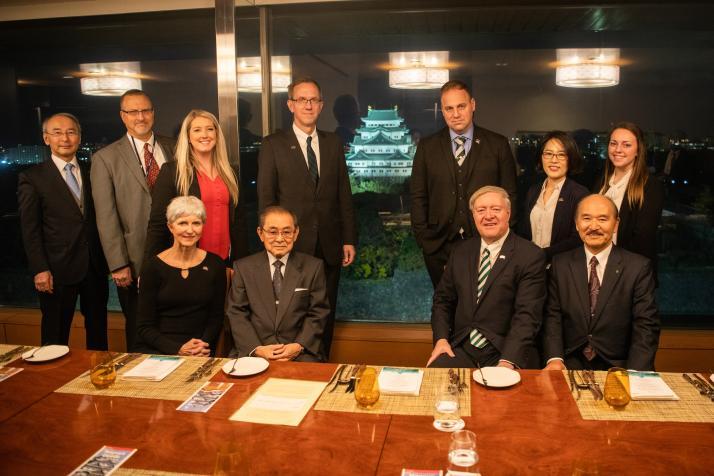张志扬,《反思》
在
Wh
Speaking of institutional platforms for collaboration, I was privileged to be part of the inception of the Tanaka-OHIO Award for Excellence in Global Engagement, which was created in celebration of the 40th anniversary of partnership between OHIO and CHUBU. The award recognizes faculty and staff at CHUBU for their outstanding contributions to internationalization efforts that help strengthen institutional excellence. Each year, the award winner is invited to visit OHIO during International Education Week (IEW), not only to participate in the formal award ceremony, but also to make connections with their counterparts at OHIO and further build academic and research partnerships. The award introduced the excellence of CHUBU faculty members in various fields that we would not have known otherwise and allowed those faculty members to deepen the institutional network. I have many fond memories of hosting these faculty members during IEW and I still stay in touch with some of them.
Under the broad framework of partnerships, it is ultimately the individuals that make connections and efforts to drive successful partnership outcomes. The faculty exchange programs and the award discussed above duly highlight the individuals that have advanced their work in their own field of study. At the same time, it is important to recognize that at the core of successful partnerships are the individuals who are working behind the scenes, sometimes going above and beyond to make things happen. The Chubu Relations Committee in collaboration with the Office of Global Affairs at OHIO helped cultivate a shared vision and ownership as well as accountability for partnership activities. Such a shared governance model created an opportunity to bring multiple campus stakeholders and offices into collaboration with each other.
I always enjoyed working with colleagues at CHUBU, from university executive leadership to administrative staff at the Center for International Affairs. They always demonstrated a deep respect, thoughtful and heart-felt hospitality, and administrative rigor and caliber. I was grateful that CHUBU
were generous with their time and attention to matters that were important to our students and faculty members. One of the strengths we shared with CHUBU was that there was considerable attention paid to sustaining regular communications with each other, managing ongoing programs and initiatives, developing common understandings, and exploring new opportunities. There was a deep-down commitment and trust that we would work through differences and offer support to each other regardless of the circumstances. To me, this impactful relationship is one of the most important products out of the 50-year history with CHUBU. My interactions with CHUBU helped reshape the way I view and manage international partnerships in my own work. Truly, relationships matter, and they transform the way we do our work, fostering collaborations and communications and further building alliance.
A visionary relationship with CHUBU which began 50 years ago through faculty exchange programs has now led to numerous high impact programs and activities that have transformed OHIO in significant ways. Together, OHIO and CHUBU have expanded the capacity for educating students, conducting research, and serving communities. Together, OHIO and CHUBU cultivated numerous global leaders and citizens, expanding horizons for many stakeholders as well as the institutions themselves and changed the outlook on internationalization in general. I have no doubt that both universities will continue to blossom in their historic partnership like the cherry trees along the Hocking River.
